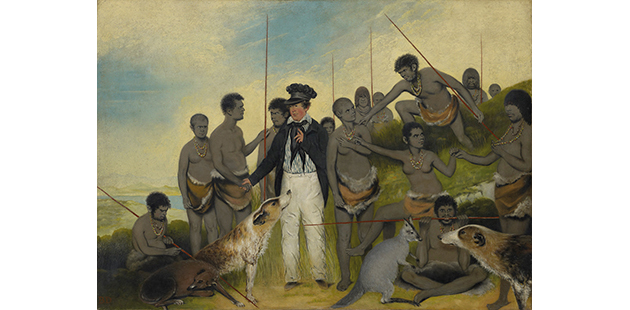 Currently on display at the National Gallery of Australia, Canberra, The national picture: the art of Tasmania’s Black War unflinchingly interrogates colonial works of art created at a brutal moment in Tasmania’s history.
Currently on display at the National Gallery of Australia, Canberra, The national picture: the art of Tasmania’s Black War unflinchingly interrogates colonial works of art created at a brutal moment in Tasmania’s history.
Developed in partnership with the Tasmanian Museum and Art Gallery (TMAG) and drawing on key loans from national and international collections, the exhibition examines British settlers’ representations of Tasmanian Aboriginal people.
The exhibition also includes rare creative works by Tasmanian Aboriginal people of the time, as well as responses of today’s contemporary artists. The result is a revelatory reconsideration of a key element of Australia’s colonial past.
Exhibition Curators Professor Tim Bonyhady (ANU) and Dr Greg Lehman (UTAS) shed new light on an extraordinary body of art, paying particular attention to the colonial artist Benjamin Duterrau – a vitally important but still under-examined figure.
“Tasmania’s visual history has much to tell about a period that we have been reluctant to properly consider,” said Dr Greg Lehman. “The work in this exhibition provides documentation that is essential evidence for an honest engagement with our colonial past. The lessons learned in Tasmania resonate across this continent.”
The exhibition focuses on the controversial ‘Conciliator’, George Augustus Robinson; and the Tasmanian Aboriginal people he attempted to ‘pacify’. It spans the commencement of the ‘Black War’, which led to the declaration of martial law in Van Diemen’s Land in 1828, the beginnings of Robinson’s ‘Friendly Mission’, to Duterrau’s death in 1851.
“Duterrau’s work, with its focus on Conciliation, demands attention at a time when Reconciliation is such an issue,’ said Professor Tim Bonyhady. “His National Picture project – a remarkable venture, unparalleled in Australian colonial art – is at last being put on the national stage.”
Aboriginal oral history and works from the 20th and 21st centuries sit alongside colonial portraits of Aboriginal people, providing vital insights into events of national and international significance.
“This is a challenging, courageous and necessary exhibition,” said Dr Gerard Vaughan, NGA Director. “The scope and complexity of The national picture is a testament to the generosity of institutions and collectors from around Australia and overseas, including TMAG and the British Museum. The NGA is proud to present this thoughtful and moving contribution to our ever-evolving national narrative.”
“It is vital that we, as a nation, revisit colonial imagery in the context of this traumatic and violent period in Tasmania’s history,” said Franchesca Cubillo, NGA Senior Curator Aboriginal and Torres Strait Islander Art. “While we can never right the wrongs of the past, we can work towards understanding our shared history with respect, patience and humility.”
The national picture: the art of Tasmania’s Black War
National Gallery of Australia, Parkes Place, Parkes (Canberra)
Exhibition continues to 29 July 2018
Free entry
For more information, visit: www.nga.gov.au for details.
Image: Benjamin Duterrau, The conciliation, 1840. oil on canvas. Tasmanian Museum and Art Gallery. Purchased with assistance from the Friends of the Museum Fund and the Murray Fund, 1945.
